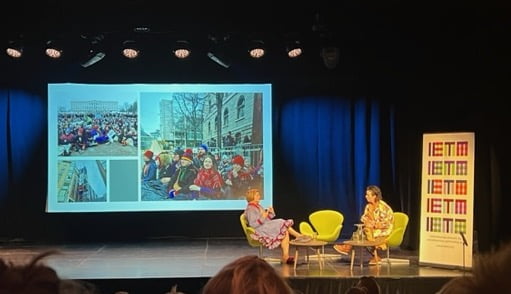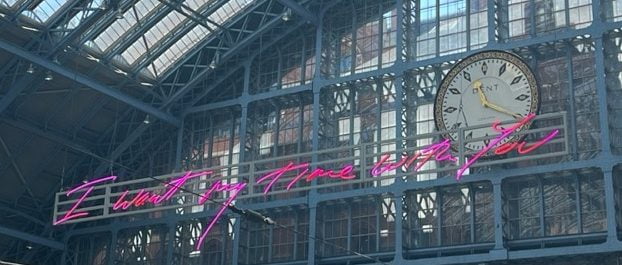I Want My Time With You
I want my time with you.
This simple statement is written in large pink neon handwriting underneath the equally large station clock at London’s St Pancras – the international train station where Eurostar trains to and from continental Europe arrive and depart. It’s a fun piece of public art, that makes passengers lift their eyes, and hopefully spirits. However, for those who chose the train over flying into continental Europe from the UK, it’s also a reminder that time is something travelling by train gives you plenty of.
For this journey I was traveling from Aberdeen in North East Scotland, to Aarhus, Denmark’s second largest city located on the east coast of Central Jutland and edge of the Kattegat Sea which divides Denmark and Sweden. I was heading to an IETM plenary (an international network for contemporary performing arts) called Living on the Edge: making performance in a time of a global climate crisis. I couldn’t possibly fly. For anyone who has any doubts on the emissions figures, a return flight from Edinburgh to Copenhagen carries with it for each passenger a CO2 emissions total of 0.428 tonnes, while the whole return train journey from Aberdeen to Aarhus comes in at 0.09916 tonnes.
As the neon sign at St Pancras reminds us, time is one of the main reasons people chose planes above trains. You ‘save’ time by flying. When you travel by train the journey simply takes longer. Much longer. In my case days longer. For the three days at the plenary in Aarhus, I spent four days getting there and back. But was it time ‘lost’? Truth is you can’t save time, only spend it and I would have spent those days working. Now I was simply swapping my office for a train. Train travel also afforded me more time to think and reflect on the plenary during the two days it took me to get home.

With Aili Keskitalo, Former Sápmi President, Sápmi/Norway and hosted by Maria Utsi, Davvi Centre for Performing Arts, Norway
When you shift thinking from saving to spending, you savour time and push back against the prevailing narrative of the scarcity economy. An economy that tells us there is not enough (time, resources, money etc.) when there is plenty if re-distributed in a different and more equitable way.
Money is the other main reason people choose flights over train travel and it’s true the train fare alone for my trip was well over twice the price of an air fare. Plus, it’s impossible to make the train journey from Aberdeen to Aarhus in a day so there were also two overnight stays in Brussels to pay for. But if we only account for economic value in our budgets, then flying will always be considered the most ‘cost effective’. However, if we include other forms of value into our accounting – environmental, social etc – we bring a broader understanding and re-evaluation of cost in all senses of the word. In this re-worked value economy, flying emerges as the most expensive form of travel.
Travelling by train also allowed me to experience the changing land and sea scapes across Northern Europe. My journey involved six stages, Aberdeen to Edinburgh, Edinburgh to London, London to Brussels, Brussels to Cologne, Cologne to Hamburg, Hamburg to Aarhus. And back again. Travelling in a semi circle from north to south and north again. And in doing so I felt more connected to the planet I was travelling across than if I’d been flying above it. Arguably the best ‘you’ of any relationship we have in our lives to spend time with.
Lesley Anne Rose
Footnote
This blog is written with the understanding that train travel is not always the best option for everyone. For anyone travelling with a disability, flying is often the better option. As well as in other circumstances.


